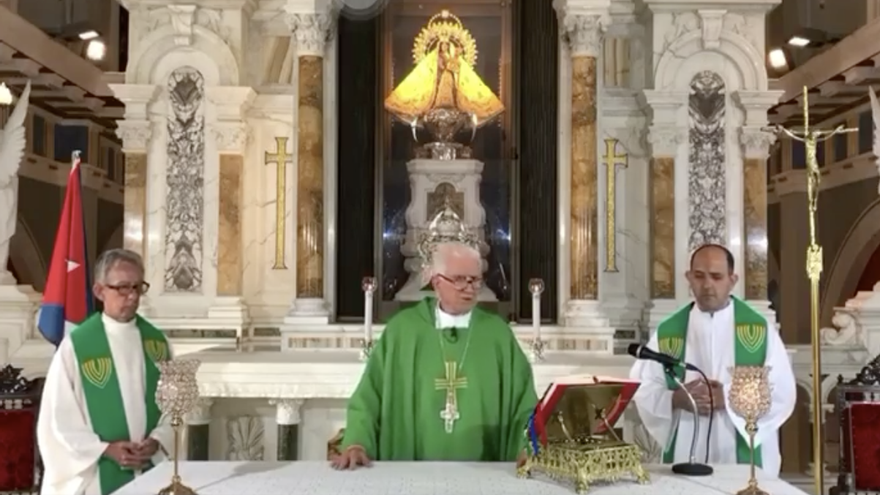
![]() EFE (via 14ymedio), Havana, 19 July 2021 — In his Sunday homily, Dionisio García – archbishop of the easternmost diocese of Santiago de Cuba – pleaded for the resolution of differences on the Island through peaceful means, and “never with violence and intolerance.”
EFE (via 14ymedio), Havana, 19 July 2021 — In his Sunday homily, Dionisio García – archbishop of the easternmost diocese of Santiago de Cuba – pleaded for the resolution of differences on the Island through peaceful means, and “never with violence and intolerance.”
“In the midst of the difficulties, the protests, the demonstrations of recent days, and because of the arrests that have been made, the repressions, the Church wants to intercede for all Cubans, for all of Cuba,” said García during his first mass following the antigovernment protests that shook various localities of the Island a week ago.
Speaking in the National Shrine of the Virgin of Charity of Cobre, Cuba’s patron saint, the prelate said that the petitionary prayers that Sunday are “above all, that there be no violence, that the logical differences that may exist in each people may be resolved through dialogue, mercy and forgiveness, and never with violence and intolerance.”
The Archbishop of Santiago recalled that the Cuban Catholic hierarchy has advocated for the need to realize “changes that will give hope and trust to our people, who need to feel respected whenever they wish to express how they feel and view our realities.” He also referred to changes that would help the people of the Island “to plan a better future and the wellbeing of their families, and that this may result in the wellbeing of the nation.”
García, a member of the permanent committee of the Conference of Catholic Bishops of Cuba (COCC), also prayed that in the current public health crisis caused by the Covid-19 pandemic, patients and the medical personnel who attend to them may have the resources they need. He emphasized the responsibility of all in the face of this situation.
Early this week, the Catholic Church in Cuba defended the right of thousands of people who took to the streets of the Island to express their displeasure with the deterioration of the economic and social situation during the unrest of last Sunday and Monday, which left one dead, several wounded, and a hundred arrested*.
In a statement, the COCC warned that “violence begets violence, the aggression of today opens wounds and feeds grudges for tomorrow that will take much work to overcome.”
Along those lines, the bishops invited “all to not energize this crisis, but rather with serenity of spir and good faith, promote listening, understanding and the attitude of tolerance, to consider and respect the other, so that together we may find ways toward a just and adequate solution.”
Pope Francis, this past Sunday, expressed his concern over the “difficult moments” that Cuba is undergoing because of the protests and called for “dialogue and solidarity” in that country, following his recitation of the Ángelus from his window at the Apostolic Palace in the Vatican.
“I am close to the dear Cuban people in these difficult moments — in particular the families, who suffer the most. I pray to the Lord to help build in peace, dialogue and solidarity a society that is ever more just and fraternal,” said the pontiff, who has on two occasions (2015 and 2016) visited the Island.
The protests of last Sunday (July 11), the most extreme that have been documented in Cuba in the last six decades, occurred while the country is submerged in a grave economic and public health situation unleashed by Covid infections, along with a severe shortage of food, medicines and other basic necessities, in addition to long-lasting power blackouts.
*Translator’s note: Much higher numbers of arrests were reported by others.
Translated by Alicia Barraqué Ellison
____________
COLLABORATE WITH OUR WORK: The 14ymedio team is committed to practicing serious journalism that reflects Cuba’s reality in all its depth. Thank you for joining us on this long journey. We invite you to continue supporting us by becoming a member of 14ymedio now. Together we can continue transforming journalism in Cuba.
